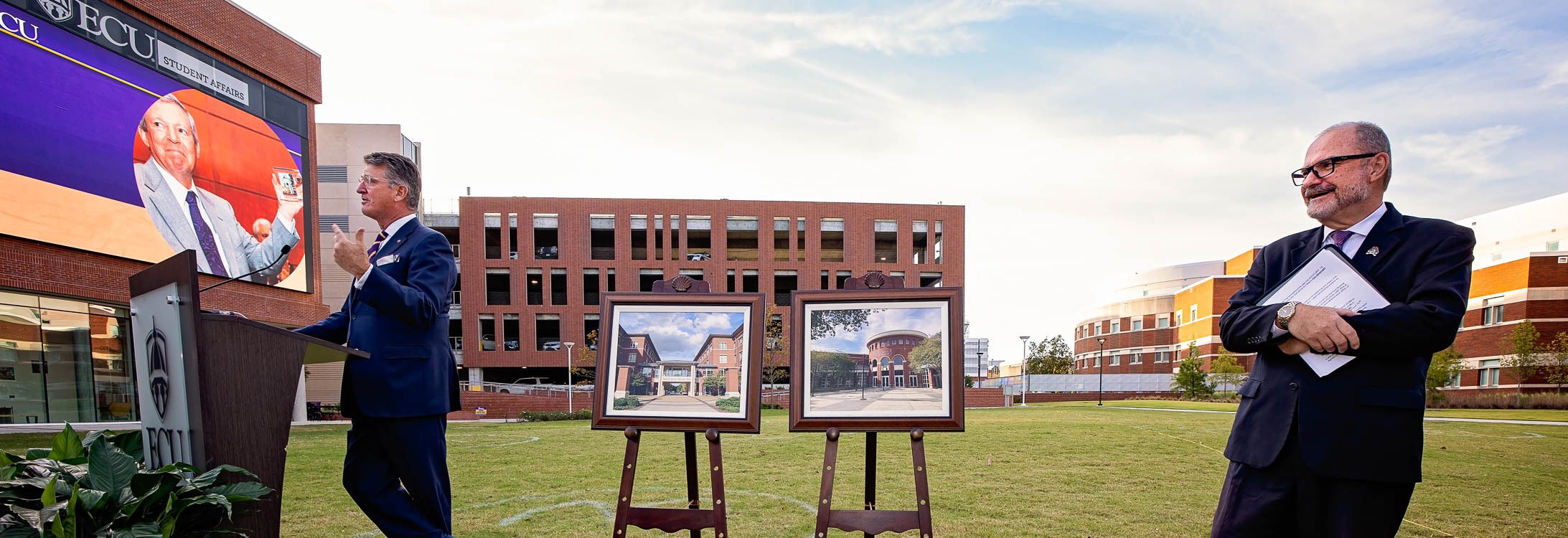BUILDING RENAMING
ECU renames two campus buildings after former chancellors
East Carolina University renamed two campus buildings in honor of former chancellors Steve Ballard and Richard Eakin during a ceremony Thursday at the Main Campus Student Center.
The Student Recreation Center is now the Richard R. and JoAnn M. Eakin Student Recreation Center, and Gateway Hall is now Steve and Nancy Ballard Hall. Both Ballard’s and Eakin’s namesake buildings are significant to their time at the university, where they served as chancellors for 12 years and 14 years, respectively.
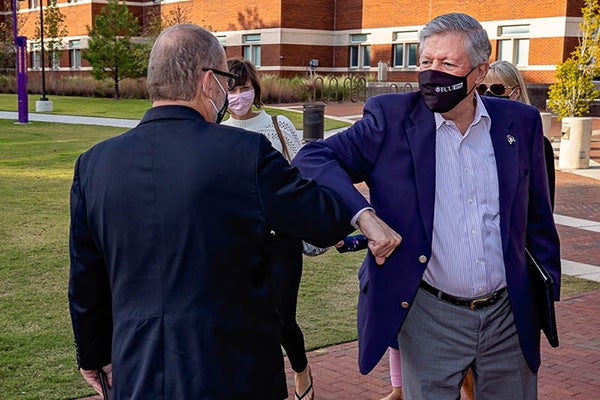
Interim Chancellor Ron Mitchelson, left, greets Steve Ballard. (Photo by Cliff Hollis)
“These strong pillars of ECU’s family left an indelible mark on this campus and its people,” Interim Chancellor Ron Mitchelson said. “I’ve been at this interim chancellor thing for one year, so I stand in awe of these two leaders. They have certainly earned our gratitude as we celebrate their enduring leadership.”
Ballard became ECU’s sixth chancellor and 10th administrative officer in 2004. As chancellor, he established the School of Dental Medicine and the Honors College, and secured funding for the new Main Campus Student Center and Gateway Hall. Gateway Hall opened in 2015 and is the hub for most of the university’s Living Learning Communities.
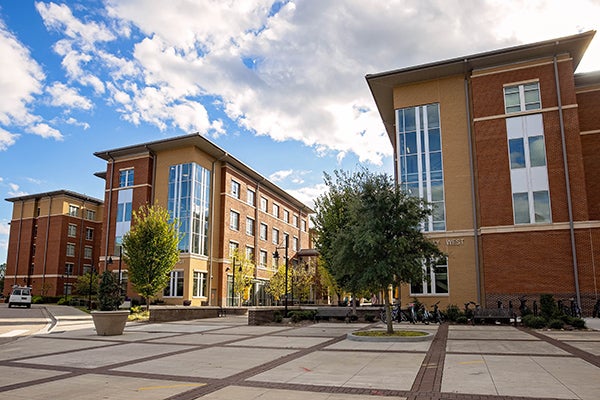
Gateway Hall opened in 2015. (Photo by Cliff Hollis)
Ballard also oversaw the move to the American Athletic Conference as well as SECU (State Employees Credit Union) Partnership East, a $2 million grant to educate teachers in rural communities. Ballard retired as chancellor 2016 but returned to ECU as a professor in the Honors College.
“ECU is a special place. I recognized it when we arrived in 2004,” Ballard said. “It seemed to be a perfect fit for us, and we stayed for 12 years because we had a strong affinity for ECU’s mission.” He thanked his wife, Nancy, who strongly contributed to the administration, he said.
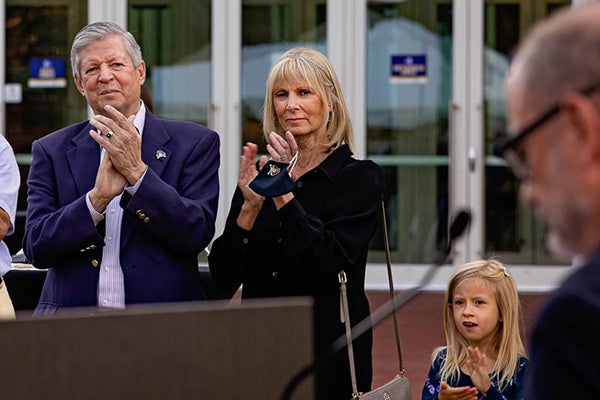
Former chancellor Steve Ballard, left, and wife Nancy listen on as Gateway Hall is renamed Steve and Nancy Ballard Hall. (Photo by Cliff Hollis)
Eakin, ECU’s fourth chancellor and eighth chief administrative officer, was unable to attend the ceremony but said before the event, “My wife and I are absolutely thrilled with this recognition. We have a great deal of love for the East Carolina family and we’re deeply touched by the university returning that love in this most tangible way.”
Before coming to ECU, Eakin played a key role in getting a student recreation center at Bowling Green State University. At ECU, he did the same, and the $18 million, 150,000 square-foot facility opened in 1997. Today it features an indoor and outdoor pool, a 12,000 square-foot weight and fitness area, indoor running track, 27-foot climbing wall, six basketball courts, three fitness studios and a new athletic training facility.
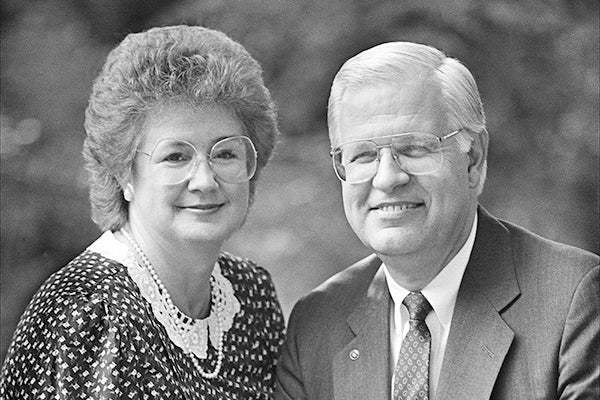
The Student Recreation Center is now named after ECU’s fourth chancellor, Richard R. Eakin, right, and wife JoAnn. (File photo)
“I was really involved with the recreation center from the very beginning. It’s always been very near and dear to my heart,” he said.
Eakin also oversaw a major expansion of Joyner Library and the university’s reclassification as a doctoral degree-granting institution. During his tenure, enrollment grew by 5,000, making total enrollment more than 18,000 students. He retired as chancellor in 2001 but returned a year later to teach higher education administration in the College of Education. He then served as interim chair of the Department of Mathematics followed by dean of the then-new Honors College. Eakin retired for the third time on June 30, 2013, capping 26 years of service to ECU.

Officials break ground on the Student Recreation Center. (File photo)
At the conclusion of the event, Mitchelson also took the opportunity to recognize K Woolard, director of ECU’s special events, who is retiring after more than 40 years.
“K served both the Eakin and Ballard administrations, and was not just their director of special events, but she was also their friend,” he said. “K – we thank you for your lifetime of service to ECU and wish you the best in your retirement.”
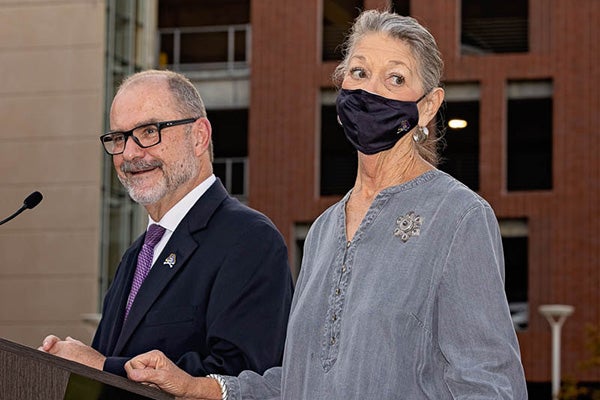
Interim Chanceller Ron Mitchelson, left, recognizes K Woolard, who is retiring after 40 years of service. (Photo by Cliff Hollis)
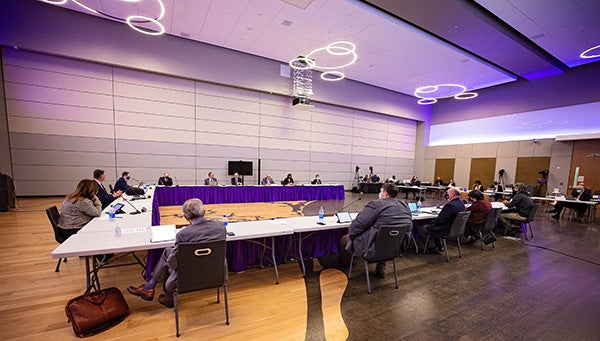
The ECU Board of Trustees meets on campus Nov. 5-6, 2020. (Photo by Cliff Hollis)
Trustees confer degrees, approve Graduate School of Business
During its regular meeting on Nov. 5-6, the East Carolina University Board of Trustees approved the conferral of degrees for about 2,000 graduates for fall commencement. The graduates will be recognized during a virtual commencement ceremony on Dec. 4 at 10 a.m.
The board also approved the establishment of the Graduate School of Business (GSB), which will replace the Office of Graduate Programs housed within the College of Business’ Center for Student Success. The GSB will oversee more than 1,000 students earning master’s degrees in business administration, accounting, sustainable tourism and other disciplines as well as multiple certificate programs.
Dr. LaNika Wright, director of Student Health Services, updated the University Affairs committee on COVID-19 numbers for the fall semester and the plans for testing, quarantine and isolation for the spring semester. She said the number of new positive cases has dropped to seven to 12 per week since the surge at the beginning of the fall semester, and she is not aware of any deaths or hospitalizations.
The plan for spring includes reentry testing — a negative test within seven days of move-in will be required for students living on campus and is strongly encouraged for those living off campus. Testing will also be conducted weekly for a percentage of students living in the residence halls, and increased testing will be provided two weeks after classes begin in anticipation of a possible surge at that time.
Testing will also be provided for students prior to going home for Thanksgiving at the end of the fall semester.
Two residence halls have been set aside for quarantine and isolation, totaling 375 beds, and more halls can be made available if needed, said Dr. Virginia Hardy, vice chancellor for Student Affairs.
During the Athletics and Advancement committee meeting, Vice Chancellor for Advancement Chris Dyba reported that the athletics and advancement offices are in the process of merging donor databases. He also gave an update on the ad hoc committee for building renaming. Gerald Prokopowicz was named chair of the committee, and a comprehensive assessment of all campus building names is expected by April.
Athletics Director Jon Gilbert said the department continues to reduce expenses in light of its revenue deficit and is launching a campaign for one-time, end-of-year donor gifts. He said that basketball begins Nov. 25 but does not anticipate selling season tickets for the sport.
On Thursday, Finance and Facilities committee members recommended increasing fees for student health services as well as housing and dining for the 2021-22 academic year.
The student health services fee would increase $56, from $263 to $319 per year, providing an estimated $1.1 million in annual revenue, said Dr. Sara Thorndike, vice chancellor for administration and finance.
Because student health is a mandatory fee, the ECU trustees’ recommendation must go to the UNC Board of Governors for final approval. The request was made to offset rising operating costs associated with COVID-19 testing and treatment, expanded hours, mental health support, supplies, repairs and equipment upgrades for the aging student health services clinic. ECU currently has one of the lowest health services fees in the UNC system, Thorndike said.
Dining plans will go up an average of 2.31% while housing will cost on average about 1.78% more than this year.
The committee requested the increase because of a projected $17 million shortfall resulting from de-densifying campus in response to the coronavirus pandemic. Food costs also have gone up. The expected shortfall is more than housing and dining has in its fund balance. A total of 40% of residence hall revenue goes to housing debt service, Thorndike said, and ECU housing must not default on that debt.
Students who stayed on campus this fall are being housed in single rooms, and students will remain in single rooms for the spring semester. While single rooms cost about $800 more than traditional double rooms, students are being charged only the double room rate because of health safety measures put in place for this academic year.
The committee requested that the cost for a single room revert to its normal amount in fall 2021, which was approved.
Additional steps have been taken to but expenses by $4-5 million this year by temporarily laying off student resident advisors, reducing utilities, closing a neighborhood services office and discontinuing programs while looking for more ways to save money, said Hardy.
The committee also received updates on several ongoing construction projects, including the Life Sciences and Biotechnology Center that remains on schedule to open next fall. Demolition work is expected to begin next quarter in the Wright Building for the planned ECU Innovation Hub, said Bill Bagnell, associate vice chancellor for campus operations.
Board of Trustees Chairman Vern Davenport reported that the Chancellor Search Committee has completed its work and made its recommendation to the UNC Board of Governors, and he announced the establishment of a Chancellor Transition Committee.
Dr. Mark Stacy, vice chancellor of ECU’s Division of Health Sciences, provided the Board of Trustees with an update of recent highlights from the division during the Health Sciences committee meeting, including:
Laupus Library using a $75,000 grant through the Institute of Museum and Library Services to provide laptops and health education instruction to the school-aged children of migrant farmworker families in eastern North Carolina.
Anne Dickerson, professor of occupational therapy in the College of Allied Health Sciences, winning the 2020 Governor’s Award for Excellence in Public Service, which recognizes service and contributions that “go beyond the call of duty and make a positive difference in the lives of their fellow North Carolinians.”
The College of Nursing recently celebrating its 60th Anniversary virtually and also being designated a Center of Excellence by the National League for Nursing for a fourth time.
The Brody School of Medicine’s Department of Psychiatry and Behavioral Medicine receiving a $1.2 million federal grant to expand telehealth-based mental health services in North Carolina.
Dr. Pete Schmidt, vice dean of the Brody School of Medicine, updated the board on how the school is using the $15 million of CARES Act funding it received from the North Carolina General Assembly toward developing better treatments, advancing vaccine research and minimizing COVID-19’s impact in the region and state while contributing to the global body of knowledge about the novel coronavirus.
“While we have not yet stopped the pandemic, our work is contributing to the mitigation of its impact,” Schmidt said. “The impact of our work is only beginning, in this domain and across healthcare in eastern North Carolina.”
-ECU News Services
